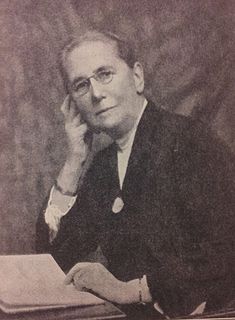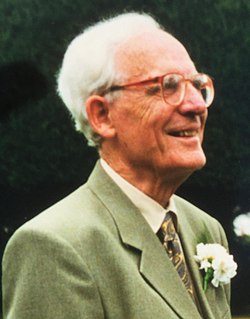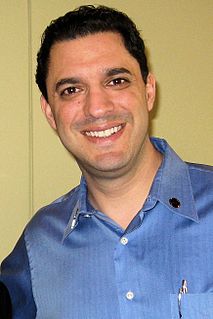A Quote by John Gresham Machen
The great redemptive religion which has always been known as Christianity is battling against a totally diverse type of religious belief, which is only the more destructive of the Christian faith because it makes use of traditional Christian terminology.
Related Quotes
Christians have always tended to transform the Christian Revelation into a Christian religion. Christianity is said to be a religion like any other or, conversely, some Christians try to show that it is a better religion than the others. People attempt to take possession of God. Theology claims to explain everything, including the being of God. People tend to transform Christianity into a religion because the Christian faith obviously places people in an extremely uncomfortable position that of freedom guided only by love and all in the context of God's radical demand that we be holy.
There is no ground whatever for the claim, so often made by religious apologists, that these ideals are specifically Christian and originated with Jesus. What were specifically Christian were some of the less enlightened teachings, which have done untold harm. Christians claim that organised Christianity has been a great force for good, but this view can be maintained on one assumption only: that everything good in the Christian era is a result of Christianity and everything bad happened in spite of it.
Religion is much more than language, but to be Christian does mean speaking Christian for most people. The language many of us use has contributed to the crisis in Christianity in North America. Traditional Christian language is becoming less familiar to millions of people. The language is frequently misunderstood by people.
It was not Christianity which freed the slave: Christianity accepted slavery; Christian ministers defended it; Christian merchants trafficked in human flesh and blood, and drew their profits from the unspeakable horrors of the middle passage. Christian slaveholders treated their slaves as they did the cattle in their fields: they worked them, scourged them, mated them , parted them, and sold them at will. Abolition came with the decline in religious belief, and largely through the efforts of those who were denounced as heretics.
There is no longer a Christian mind ... the modern Christian has succumbed to secularization. He accepts religion - its morality, its worship, its spiritual culture; but he rejects the religious view of life, the view which sets all earthly issues within the context of the eternal, the view which relates all human problems social, political, cultural to the doctrinal foundations of the Christian Faith, the view which sees all things here below in terms of God's supremacy and earth's transitoriness, in terms of Heaven and Hell.
If the Christian church is to move responsibly towards the future, it must restore or renew its ties with its past. Contemporary Catholic and Protestant radicals want to claim that Christianity means whatever Christian today happen to believe and practice, be it pantheism, unitarianism, or sodomy. The Christian faith has suffered immeasurable harm because of the tendency of people to use the word Christian in a careless and non-historical way. Nothing in this argument would preclude liberal Protestants and Catholics from developing and practicing any religion they like.
Why did the consensus of Christian churches not only accept these astonishing views but establish them as the only true form of Christian doctrine? . . . these religious debates - questions of the nature of God, or of Christ - simultaneously bear social and political implications that are crucial to the development of Christianity as an institutional religion. In simplest terms, ideas which bear implications contrary to that development come to be labeled as 'heresy'; ideas which implicitly support it become 'orthodox.'
It's no understatement that the church has done a poor job in teaching our young people that reason and faith are not opposites, and that atheists are far from being on the side of reason. You can find on our website a chart which I use to demonstrate the various worldviews work out, and which one, Christianity, is rational. Many kids, however, who grow up huddled in a Christian environment find themselves in the university setting completely unequipped to defend the rationality of the Christian faith against the secular humanist worldview so prevalent on college campuses.
I was born into a Christian household, in a parsonage in fact, so I grew up in sort of a missionary atmosphere but it was an environment which involved both the traditional religions as well as the Muslim religion, so we were exposed to all the various facets of faith, micro cultures which existed within those beliefs, and even though I've lost whatever Christian faith was drummed into me as a child, I still maintain very good relationship with all the various religions.
Apart from it, the incarnation and the ministry would lose all their significance, the crucifixion would be but a martyrdom, and the cross a symbol of the victory of death over life. By the Resurrection it was that the Crucified One was "declared to be the Son of God with power," the great truth on which the Christian's faith is founded, and to which his hope is anchored. That Christ died for our sins is the Gospel of the Christian religion regarded as a human cult. The Gospel of Christianity goes on to declare "That He rose again the third day according to the Scriptures"
In a Christian Theocracy, you'll never be Christian enough. There's always going to be somebody there with another version of Christianity that is more Christian than you and you're going to lose the freedom to make the choice because you didn't defend the Separation of Church and State when you had the chance.
Liberal Christianity, of course, has enemies, but they are everyone's enemies - sexism, racism, homophobia. But liberal versions of Christianity, which can be both theologically and politically conservative, assume that what it means to be Christian qua Christian is to have no enemies peculiar to being Christian.





































